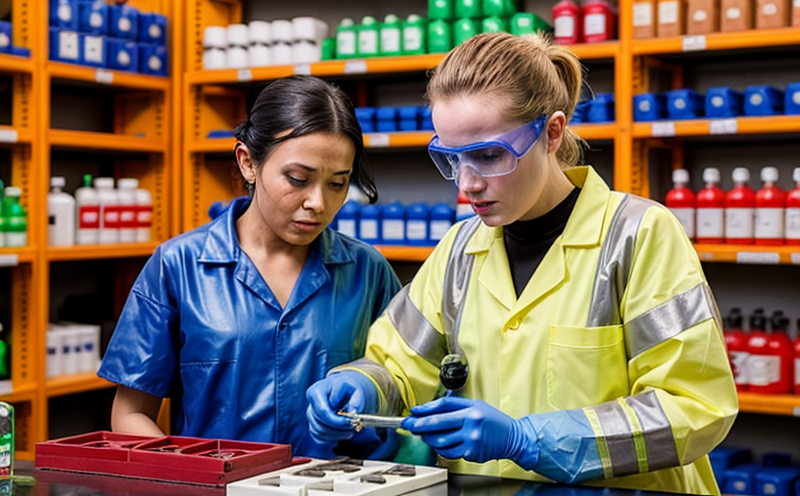ISO 23913 Nanomaterial Safety Testing for Hazardous Chemicals in Trade
The ISO 23913 standard is a cornerstone for ensuring that nanomaterials are handled, transported, and traded safely across borders. This service focuses on the comprehensive safety testing of hazardous chemicals involving nanomaterials, which are increasingly used in various industries but pose unique challenges due to their small size and potent effects.
Our laboratory specializes in providing detailed analyses under ISO 23913 guidelines to ensure that all chemical substances meet stringent international standards. This includes assessing the environmental impact, occupational health risks, and potential hazards associated with these materials during trade.
The process begins with rigorous sample preparation using advanced techniques such as transmission electron microscopy (TEM) and dynamic light scattering (DLS). These methods allow us to precisely characterize the nanomaterials' physical properties, including size distribution, shape, and aggregation behavior. Once characterized, we conduct toxicity testing on various biological models to evaluate potential health risks.
For hazardous chemicals, specific tests are conducted to determine their flammability, reactivity, and corrosivity under different environmental conditions. Additionally, our team assesses the material's compatibility with packaging materials used in international trade, ensuring compliance with relevant regulations such as REACH (Registration, Evaluation, Authorisation and Restriction of Chemicals).
The testing also includes evaluating the nanomaterial's potential to form complexes or undergo chemical reactions during transit. This ensures that the material remains stable throughout its journey from production sites to end-users.
- Sample Preparation: Advanced TEM and DLS techniques for precise characterization.
- Toxicity Testing: Biological models to evaluate health risks.
- Environmental Impact: Assessing the material's effect on ecosystems during trade.
- Compatibility Testing: Ensuring materials are safe in packaging used for international transport.
Our team of experts ensures that every aspect of ISO 23913 is meticulously followed, providing comprehensive reports that meet the highest standards required by regulatory bodies worldwide. By partnering with us, companies can confidently ensure their products comply with global safety protocols and avoid potential legal issues associated with non-compliance.
The importance of this service cannot be overstated, especially given the growing use of nanomaterials in industries such as electronics, textiles, and pharmaceuticals. Our rigorous testing ensures that these materials are handled safely throughout their lifecycle, from production to disposal.
Eurolab Advantages
At Eurolab, we pride ourselves on offering unparalleled expertise and advanced facilities for ISO 23913 nanomaterial safety testing. Our state-of-the-art laboratory is equipped with the latest instrumentation and software solutions, ensuring precise and reliable results.
- Advanced Facilities: Equipped with the most sophisticated equipment to handle complex nanomaterials.
- Expert Team: Highly skilled professionals with extensive experience in nanotechnology and safety testing.
- Comprehensive Reporting: Detailed reports that provide actionable insights for stakeholders.
- Regulatory Compliance: Ensuring all tests meet the highest international standards.
We understand the critical nature of this work, which is why we offer flexible service packages tailored to your specific needs. Whether you require one-off testing or ongoing support, our team will work closely with you to develop a comprehensive strategy that meets your objectives.
Our commitment to excellence extends beyond just meeting regulatory requirements; we also strive to provide insights into the broader implications of nanomaterial safety in trade. This includes understanding how these materials interact with various environments and identifying potential risks early on, allowing for proactive mitigation strategies.
International Acceptance and Recognition
The ISO 23913 standard is widely recognized for its thoroughness and reliability. It has been adopted by numerous countries around the world, ensuring that nanomaterials are handled safely across borders.
In addition to compliance with international standards, our testing results are accepted in regulatory submissions globally. This recognition not only enhances your product's reputation but also streamlines the certification process for import and export.
Our clients benefit from this global acceptance, as it allows them to confidently present their products to customers worldwide, knowing that they meet stringent safety requirements. We continuously update our methodologies to align with emerging standards and best practices in nanotechnology safety testing.





